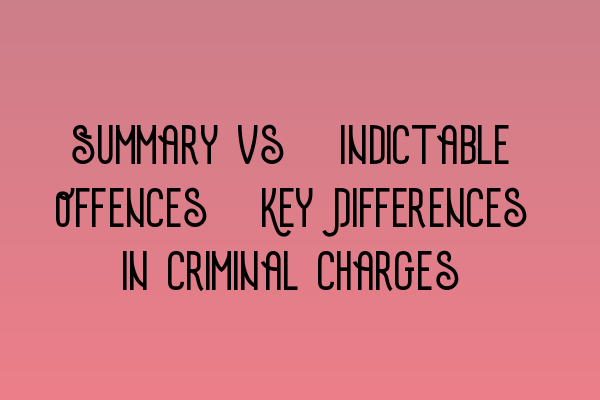Summary vs. Indictable Offences: Key Differences in Criminal Charges
Welcome to the SQE Criminal Law & Practice Law UK blog! In this post, we will explore and discuss the key differences between summary and indictable offences in the realm of criminal charges. Understanding these differences is crucial for solicitors and individuals involved in criminal cases, as it can significantly impact the legal process and potential outcomes.
What are Summary Offences?
Summary offences are less serious criminal offences that are typically heard in the magistrates’ court. These offences are usually dealt with summarily, meaning they are resolved without the need for a jury trial. The majority of criminal cases in the UK fall into this category.
Examples of summary offences include common assault, minor theft, public disorder, and certain traffic offences. Although they are generally less severe, summary offences can still carry significant penalties, such as fines, community service, and short-term imprisonment.
Related Article: Business Regulations in the UK: A Comprehensive Overview
What are Indictable Offences?
Indictable offences, on the other hand, are serious criminal offences that are generally tried in the Crown Court with a jury. These offences include crimes such as murder, robbery, drug trafficking, and fraud. Due to their severity, indictable offences often result in longer prison sentences and more complex legal proceedings.
Indictable offences can be categorized into two subcategories:
- Indictable-only offences: These are crimes that can only be dealt with in the Crown Court. They include crimes like high-value fraud, manslaughter, and conspiracy to commit a serious crime.
- Either-way offences: These are crimes that can be tried either in the magistrates’ court or the Crown Court, depending on factors such as the seriousness of the offence and the defendant’s choice. Examples include theft, assault causing actual bodily harm, and some drug offences.
Related Article: Decoding Corporate Structures: A Comprehensive Legal Insight
Key Differences between Summary and Indictable Offences
Now that we understand the basic definitions of summary and indictable offences, let’s examine some key differences between the two:
- Court Jurisdiction: Summary offences are tried in the magistrates’ court, while indictable offences are tried in the Crown Court.
- Legal Proceedings: Summary offences are usually dealt with summarily by a magistrate or a panel of magistrates, whereas indictable offences are subjected to more formal legal proceedings, including a jury trial.
- Potential Penalties: Summary offences generally carry less severe penalties, such as fines, community service, and short-term imprisonment. Indictable offences, on the other hand, can result in lengthy prison sentences, especially for more serious crimes.
- Defendant’s Choice: For either-way offences, the defendant may choose whether they want to be tried in the magistrates’ court or the Crown Court. This decision is often influenced by factors such as the complexity of the case and potential sentencing differences between the two courts.
Related Article: LLC Formation Made Simple: Step-by-Step Guide for UK Entrepreneurs
Seeking Legal Advice for Summary and Indictable Offences
If you are facing criminal charges, whether summary or indictable, it is crucial to seek the assistance of a qualified solicitor. A solicitor specializing in criminal law can provide you with the necessary legal advice, guide you through the legal process, and help you achieve the best possible outcome in your case.
At SQE Criminal Law & Practice Law UK, our experienced team of solicitors is dedicated to providing top-notch legal representation for clients facing all types of criminal charges. We understand the complexities of summary and indictable offences and will work tirelessly to protect your rights and interests.
For more information about our services or to schedule a consultation, contact us today! We are here to help.
Related Articles:
- LLC Formation: A Step-by-Step Guide for UK Entrepreneurs
- Business Regulations in the UK: A Comprehensive Overview
- Decoding Corporate Structures: A Comprehensive Legal Insight
